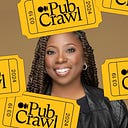I Sincerely Appreciate Black History Month and Here’s Why
Learning “Black Facts” as a kid bolstered me as an adult.
Black History Month serves a purpose, and I’m glad we have it. It doesn’t replace any other form of education but at the very least it could be a place to start for those who need to — and want to — know.
When I was little, my church Black History Month programs usually involved us wearing our version of what we thought African dress looked like, and reciting poems by Paul Lawrence Dunbar or Gwendolyn Brooks. We would make buttons that declared “I Am Somebody,” that statement first made popular in the ’80s by Rev. Jesse Jackson. And we — no, I — believe it.
I’ll never forget the first time somebody told me I was a dark and worthless nobody and had no value due to the color of my skin. And in my little eight year old voice with my little scrawny eight year old arms, I put my hands on my scrawny hips and told that grown White person: “But that’s not what Jesse Jackson said! And that’s not what Rev. Woolfolk said. And that’s not what my Daddy said. I AM somebody and don’t you forget it.”
Those Black History facts and Black history teachings and poetry recitations got etched into my soul. The church elders all sitting in the front row, encouraging me and pouring into me. Blessing me with “God Bless that Baby” and “That baby Sure is Smart” and “That Baby Sure is Going Places” and “That Baby Sure is Her Daddy’s Daughter.” That stuff? I heard it and it stuck. Paired with the pride with which I learned my Black facts, those words got locked into my chest and became a shield against all the negative comments lobbied at me later for the rest of my life.
Black facts grounded me in myself and placed me within history. Later in life those Black facts were the basis for continued study in race, history, sociology and even workplace dynamics. That basis of knowing my own value and knowing what we bring to the table was helpful in navigating circumstances where people openly try to shame me — and other people of color — in situations both public and private. You need to know your facts in order ot counter a negative narrative.
I remember the questions like it was yesterday. Name 14 Black inventors and why they were important. Which Chicago public schools are named for Black people and why? (Dunbar high school and Percy Julian high schools immediately come to mind.) Who were the Black astronauts on the Challenger? Who was the Black astronaut who attended your high school? Who are our Black millionaires and how many live in Chicago? Who are the top athletes in the world and how many of them are Black? And most important for me were facts on all the Black writers, the novelists, the fantacists, the storytellers who proved that Black stories matter and later in life showed me that Black writers can tell all stories — not just quote unquote Black ones.
First I learned their names and then I read their books. Arna Bontemps, Richard Wright (who was my grandfather’s room mate for a spell,) Virginia Hamilton and Gwendolyn Brooks became my North Star. Their words sounded familiar. No one chided them for talking “proper” or for talking “Black.” Both languages existed at once in their writing. They showed me possibilities.
We even had Black facts flashcards. As a kid I might have balked sometimes at having to memorize and regurgitate the information, but as an adult who is raising my own kids, I am glad my parents raised me in this way. Not only do I know my own value, but I recognize the value in all others. I recognize the value in our history. Nothing I am going through exists in a vacuum. These giants — these ancestors — went through it first and created strategies for success. If they did it, I can do it. And that’s what I teach my little sons who currently talk big, like Muhammad Ali. When a stranger says: “You’ll be smart one day,” my oldest always replies: “I’m already smart. I was born smart. I was born a genius.”
Now, a lot could be said of people who walk up to small kids in this climate and say anything to them at all without first asking a parent for permission but I digress. The overall point here is that my kids know that being smart is not an anomaly, it is a norm. Being an inventor is not a rarity, it is the expectation established by history. Being musically and mathematically gifted is their birthright and inheritance. Dunbar and Brooks were somebody. Their grandparents and great grands and great great grands were somebody. Their daddy and mama are somebody. And they are somebody too.
This Black History Month above all others carries a special significance given the hell we went through in 2020 and still are bracing ourselves for in 2021. My children will learn their age-appropriate Black facts. One day they’ll need them.

